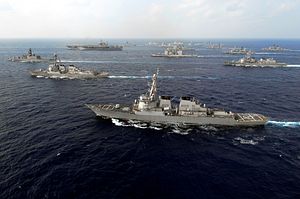When the United States sent the USS Lassen within 12 nautical miles of the artificial island China has built at Subi Reef, Washington promised that this would be the first of many routine freedom of navigation operations (FONOPs) in the South China Sea. That has raised questions about how U.S. allies will respond.
According to the Wall Street Journal, Australia is mulling the option of conducting its own operations. Meanwhile, media reports from earlier this year suggested that Japan was also considering conducting patrols in the South China Sea. Admiral Katsutoshi Kawano, chief of the Joint Staff of the Japan Self-Defense Forces, said in June that “we don’t have any plans to conduct surveillance in the South China Sea currently but depending on the situation, I think there is a chance we could consider doing so.”
However, Japan’s response to the USS Lassen’s maneuvers on Tuesday was less enthusiastic than may have been expected. As Jake Douglas outlined for The Diplomat, Japanese officials – including Chief Cabinet Secretary Yoshihide Suga and Defense Minister Gen Nakatani – declined to either support or criticize the FONOP, though Prime Minister Shinzo Abe eventually offered his support. The problem for Japan is that it is caught between two conflicting impulses: a strong desire to maintain a close partnership with the United States, and a tacit recognition that the South China Sea is simply not a life-or-death issue for Tokyo.
Japanese defense officials and security analysts are adamant that a watertight U.S.-Japan alliance is the bedrock of Japan’s national security. As Satoru Mori, a professor at the Department of Global Politics in Hosei University’s Faculty of Law, put it for The Diplomat, “Tokyo is in sync with Washington, in the sense that … because of China’s military rise we have to enhance deterrence” by strengthening the alliance. The ultimate goal of that deterrence is to “encourage China to actually come on board what we call the rules-based order,” Mori said.
The South China Sea is one of the key areas where China is seen as contravening international law and thus that rules-based order. Given that – and comments by some U.S. officials indicating that they would welcome Japan’s participation in South China Sea patrols – it seems like an easy step for Tokyo to take a more active role in the disputes. But Koji Kano, the director of defense policy at Japan’s Ministry of Defense, tells The Diplomat that actually, “From the viewpoint of pure military affairs, what we really can do [in the South China Sea] is very modest.”
After all, Kano says, Japan is not a party to the territorial disputes. It will certainly “keep watch” on the region, as any incidents could have ramifications for Japan’s security. But Kano gave no indication that Japan plans to take up a more direct role. Tokyo’s interests are largely based on seeing freedom of navigation and similar international principles upheld. In that sense, Kano says, “We are not concerned, we are interested in what’s going on the South China Sea and how international society will react to what might happen in that area.”
That may come as a surprise to Washington. Yuichi Hosoya, a professor of international politics at Keio University, told The Diplomat that “the biggest demand coming from the U.S. government is [for Japan] to do some ISR [intelligence, surveillance, and reconnaissance] operations in the South China Sea.”
But “this is not that probable” Hosoya says. “I don’t think that the Japanese government can do ISR operations in the South China Sea… Even in the East China Sea, Japanese activities are overstretched.” Instead, Japan is trying to help Southeast Asian coast guards build up their own capacities.
Ultimately, on the South China Sea issue, Japan cannot do much outside of diplomatic statements in support of peaceful resolution of disputes and the rules-based international order, Hosoya said. Despite this, some regional states may have misinterpreted Japan’s recent security reforms and wrongly believe that Tokyo is going to take up a more active security role in the South China Sea.
That’s exactly the sort of misinterpretation Tokyo wants to avoid. Shigeru Ishiba, a former Japanese defense minister currently serving as regional revitalization minister, says that it’s important for the United States to understand the limitations of Japan’s security posture, even after security reforms granted Japan the ability to participate collective self-defense. If the United States were to assume that Japan would be able to exercise its right to collective self-defense in a certain situation, but Japan disagreed, it could “lead to a very significant situation,” Ishiba explained. “We have to clarify under what circumstances we’ll be able to exercise collective self-defense.”
Ishiba adds that the recently passed security legislation had “nothing to do with” potential South China Sea patrols by Japan, although he thinks that Japan’s Maritime Self Defense Force and Air Self Defense Force could play a more active role in the region.
As attractive as it may be for pure security reasons for Japan to join the U.S. in patrolling the South China Sea, Japanese analysts ultimately believe their government doesn’t have the necessary public support to do so.
Japanese people “don’t really have a full understanding of what a particular international crisis or incident means for Japan,” Mori explains, which means they are generally reluctant for their country to become involved.
Hosoya agrees that the Japanese public generally only supports security commitments abroad if there are direct implications for Japan’s survival – and people “do not think that the issues in the South China Sea have a strong link to Japanese national survival.” That means Japan won’t be able to do much in the South China Sea on the security front.
In that sense, Hosoya says bluntly, “I don’t think that the Japanese government and Japanese people are serious about what’s happening in the South China Sea.”
































